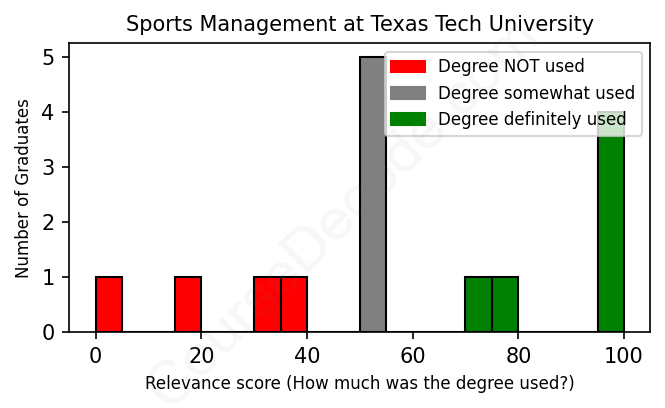
First, some facts. Of the Sports Management graduates from Texas Tech University we've analyzed , here's how many have used (or NOT used) their degree in their career:

These are estimates based on AI analysis of 15 LinkedIn profiles (see below).
The verdict? Below average. Overall, with an average relevance score of 58%, Sports Management graduates from Texas Tech University have a lower likelihood (-9%) of finding work in this field compared to the average graduate across all fields:
And for comparison, here's the chart for all profiles we've looked at across all degrees.
Also, after graduating, only 26% of these graduates have pursued further education other than another Bachelor's degree (such as a Masters degree or other), compared to the average across all profiles of 35%. This suggests a Bachelors degree is enough for most Sports Management graduates, and it's normal to look for work straight after graduation.
See the details:
|
Relevance score: 100% We think this person has gone into a career highly relevant to their degree. We think this person has gone into a career highly relevant to their degree.
DEGREE INFOGraduated in 2022 from Texas Tech University with a Bachelor's degree in Sports Management. No other secondary education since. JOB HISTORY SINCE GRADUATIONProsper ISD Athletics Intern Prosper ISD Jun 2022 - Aug 2022 ABOUTNo information provided. |
The top 10 most common jobs done by the graduates we've analyzed (ranked most common to least) are:
After checking out the job history of folks who graduated with a Sports Management degree from Texas Tech University, it looks like they're landing in quite a mix of roles. Some are getting directly involved in sports-related jobs, like working at Spurs Sports & Entertainment or Texas Tech Athletics, where their education is super relevant. Other positions, like branch managers at rental car companies or account managers in different sectors, show that while they might be using a few transferable skills, these roles aren't necessarily tied to sports management. It seems like the degree opens up some doorways, but not always into careers that make the most of what they learned in school.
In fact, many graduates have found their way into roles that lean more toward general business rather than the sports industry. For instance, jobs in sales, customer service, and even hospitality dominate the list. While these roles might use the soft skills developed in a Sports Management program—like teamwork and leadership—they don’t engage with the specifics of sports management expertise. So, while some are finding great opportunities in sports-centric roles, a good number of grads are steering their careers in directions that don't fully capitalize on their degree. It's a bit of a mixed bag overall!
Here is a visual representation of the most common words in job titles for Sports Management graduates (this is across all Sports Management graduates we've analyzed, not just those who went to Texas Tech University):

When looking at the career trajectories of Texas Tech University graduates who studied Sports Management, it’s a bit of a mixed bag. Right after graduation, many seem to jump into roles that pivot away from direct sports management positions. For instance, several alumni found jobs as account managers, sales representatives, and even in finance roles like consumer lending. It’s not unusual for recent grads to take jobs in areas that might not seem directly related to sports, especially at the start. However, some graduates did find their way into sports-related roles, such as game day operations and guest services, but these are often more entry-level or internship-type positions.
Fast forward five to ten years, and you see a more varied picture. While some graduates have made strides into management positions—like a branch manager at Austin Turf & Tractor or project engineers in construction—many others remain in roles that don’t directly tie back to their Sports Management roots. Over time, there’s a trend towards stability, with many climbing the ladder in their respective fields, though often outside of sports. So, while some people have turned their degrees into good careers within the sports industry, it seems that a significant number have pursued opportunities in other sectors entirely. If you’re hoping to make a solid career in sports, it may take a little extra work—or a few internships—after graduation to get there!
Honestly, a Bachelor’s degree in Sports Management at Texas Tech University is pretty manageable, especially if you have a genuine interest in sports and enjoy related subjects like business, marketing, or psychology. The coursework mixes theory with practical applications and you’ll probably find a lot of your classes engaging, which can make the learning experience feel easier. That said, like any college program, it requires dedication and time management, so it might be a bit challenging if you're not used to balancing schoolwork and assignments. Overall, it’s somewhere around the average in terms of difficulty, but if you're passionate about sports, you might not find it too tough!
Most commonly, in the LinkedIn profiles we've looked at, it takes people 4 years to finish a Bachelor degree in Sports Management.
Looking at the careers of these Texas Tech graduates, it seems like they’re on a pretty decent trajectory, but it really varies depending on their specific roles. Some, like the Account Managers and Branch Managers, likely pulled in good salaries, especially at companies like Enterprise and PepsiCo, where management positions tend to pay well. Others are still in earlier stages of their careers, often in internships or entry-level roles, which probably don’t pay as much initially. For those fresh out of school, it might take a bit longer to hit those higher salary benchmarks. Overall, while some might be doing quite well, others are still climbing the ladder, so there’s a mixed bag of financial success here.
Here is a visual representation of the most common words seen in the "about" section of LinkedIn profiles who have a Bachelor degree in Sports Management (this is across all Sports Management graduates we've analyzed, not just those who went to Texas Tech University). This may or may not be useful:

Here are all colleges offering a Bachelor degree in Sports Management (ordered by the average relevance score of their Sports Management graduates, best to worst) where we have analyzed at least 10 of their graduates: